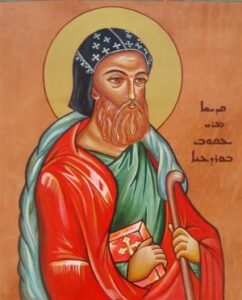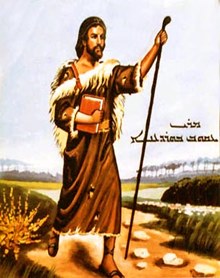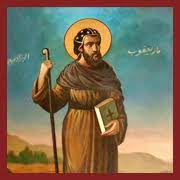St. Jacob Baradaeus – Yakub Burdhana – Jul 31/ Nov 28 I Venerable and Holy Father I Upholder of Orthodox Faith

St. Jacob Baradaeus (Yakub Burdhana), was a great saint, and one of the well-known Church Fathers, known for his godliness and piety, the greatest Apostolic fighter in support of the True faith, who attained the summit of religious and austere asceticism. He was born at Tella Mouzalat, otherwise called Constantina, near Nisbis, which is 55 miles East of Edessa, as the son of Priest, Theophilus Bar-Manu. His parents did not have children for a long time and in pursuance of a vow of his parents, he was dedicated to God. At the age of 2 years, he was entrusted to the care of Eustathius, the chief of the Monastery at Phaselita, near Nisbis.
One day Yakub’s mother visited the monastery and wanted to take him with her. He was not willing to go home even for a visit and said: “I am fully dedicated to Christ and that my mother has no share in me.” After the death of his parents, he distributed all the properties that he inherited from his parents among poor people and reserved nothing for himself. He said: “Let the wealth of the world be to the world.” He even released two slaves whom he inherited and left the house and estate for them.
After the training at Phaselita monastery, where he learnt Greek, Syriac and the basics of asceticism. He penetrated deeply into religious books and theological science as well as asceticism. He was a great scholar, a successful preacher and a capable theologian. Yakub was ordained deacon and subsequently became a priest. He was ordained a universal bishop in 543/4 AD by Mar Theodosius, Patriarch of Alexandria who was exiled at the time in Constantinople, to ensure the survival of non-Chalcedonianism. He was known by his piety and working miracles. His reputation for working miracles spread to such an extant that sick people came from far and near to be healed by him. St. Yakub raised the dead, the blind was restored to sight, rain was given, and even the Sun was made to stand still. Edessa, when attacked by Chosroes I, after the capture of Batnae (Isnik in Turkey, the place where Council of Nicea met in A. D. 325; and other towns on the Euphrates, the prayers of St. Jacob saved the people and Chosroes was scared by a terrific vision. His fame spread over the East. The empress Theodora, the wife of Emperor Justinian, wanted to see him. However, Yakub was not inclined to go to Constantinople. Later, in a vision, Severus, the Patriarch of Antioch, and Mar John, the late bishop of Tella, directed him to go to Constantinople to which he obliged. On the arrival of St. Yakub at Constantinople, Theodora received him with honor, but the splendor of court had no concern or attractions for him. He went to Constantinople in about A. D. 528 and remained as a complete recluse, there in a monastery for fifteen years
Justinian, the emperor, had resolved to enforce the Chalcedonian decrees universally, and the bishops and clergy who refused to accept the decrees were punished with imprisonment, deprivation and exile. Yakub Burdhana was detained in a castle, a kind of honorable imprisonment. As a result, the faithful were deprived of their spiritual pastors and for about ten years many Churches had been destitute of the sacraments, since they were not ready to accept sacraments from the heretics.

Yakub Burdhana had the simplest mode of life, inured to hardship from his earliest years, tolerant of the extremities of hunger and fatigue, “a second Asahel for fleetness of foot” fired with an unquenchable zeal for what he regarded as the true faith, with a dauntless courage that despised all dangers, in his tattered beggar’s disguise, traversed on foot the whole of Asia Minor, Syria, Mesopotamia and the adjacent provinces, even to the borders of Persia, everywhere ordaining bishops and clergy. He both exhorted the faithful and sent encyclicals encouraging them to maintain the true faith. He is stated to have ordained the incredible number of 80,000 clergy. John of Ephesus says 100,000, including 89 bishops and two patriarchs (probably are Sergius (544-547) and Paul II (550-578). Probably no cleric in history ordained as many bishops and patriarchs as Jacob, though he himself never aspired to attain the patriarchal dignity. He is responsible for restoring and saving the Church from extinction by his indomitable zeal and this untiring activity. Justinian, the emperor, and Catholic bishops were angry at the successful missionary labour of St. Yakub. Orders were issued for his apprehension and rewards were offered for his capture. However, in his beggar’s garb, aided by the friendliness of Arab tribes and other chiefs and the people of Syria and Asia, he eluded all attempt to seize him. His labours paved the way for establishment of the Church as the National Church of Syria. Imperial persecution could not repress his work.

Yakub known by the surname Baradaeus. The surname Baradaeus is derived from ‘baradai’ (clad in rags) or the ragged mendicant’s garb, patched-up out of the old saddle-cloths to disguise his spiritual functions from the eyes of the authorities, which he used for his swift and secret journeys in Syria and Mesopotamia to avoid arrest by the imperial forces. John of Ephesus states that the origin of his surname is that he cut a coarse robe into two pieces, and wore one-half as an under garment, and the other half as an upper garment without changing them during summer or winter until they grew quite ragged and tattered. Burd’ono, the nickname is derived from the Syriac word ‘Burd-o’ meaning saddle-cloth. Thus, his rough garments became like saddle-cloth, hence he was called Burd`ono.
“Jacob Baradaeus, bishop of Edessa, was instrumental in organizing their community; hence, they have been termed ‘Jacobites’. There were trustworthy bishops who supported Yakub Burdhana. Yakub Burdhana died at the monastery of Romanus or Cassianus on July 30, 578. His episcopate is said to have extended over 37 years, and his life, to 73 years. According to a short account by Cyriacus, bishop of Mardin, the remains of Yakub Burdhana were kept at the monastery of Cassian until A. D. 622 (621?). Thereafter the relics were translated to his monastery of Phaselita, near Tella Mouzalat by Mor Zakkai, the episcopa of Tella (Paulose Aphrem, 1963). He has written a liturgy in fifteen pages beginning with “O Lord, the most holy Father of peace” and several letters, which are published in Syriac. He encouraged its followers to preserve the jewel of the Orthodox faith that it received from the righteous Apostles and Fathers. The feast of St. Yakub Burdhana the protector of faith, is celebrated on July 31 and November 28.
0 Comments